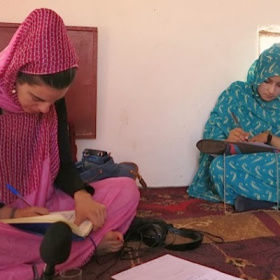Violeta Ruano Portraits of Saharawi Music (British Library)
Bio
With a total of 133 music items, the Portraits of Saharawi Music is the result of six months of ethnographic fieldwork in Saharawi refugee camps, in south-west Algeria. The music archive was compiled by Violeta Ruano during 2013 and 2014. The collection includes a variety of music recordings whose aim is to showcase the rich cultural heritage of the Saharawi community living in exile since 1975, when they were forced out of their homeland, Western Sahara. Known as Africa's last colony, the Saharawi’s land is to this day still occupied by Morocco and pending decolonization.
Born in 1973, Saharawi revolutionary music is the foundation of the Polisario Front. Leaders of the independent movement, mostly young students, took a bunch of traditional songs that were well known by the population and changed the lyrics, adding didactic words about their cause. These songs were then performed in secret meetings, some of them recorded and distributed throughout the territory on smuggled cassettes. In some videos, revolutionary songs sung by Habuza, one of the original singers could be heard 40 years after it was sung for the first time.
Once in the refugee camps, this music was institutionalised and really supported by the newly formed Saharawi government. It received the name of nidal (about the nation) and the cultural authorities created local and national bands exclusively dedicated to its performance. Throughout the war years, nidal music was one of the cultural milestones of the Saharawi struggle, raising awareness about it, encouraging the fighters at the front and keeping the revolutionary spirit high among the refugees. Songs such as ‘The Sahara is not for sale', featured in the following video, really helped in keeping the revolution alive. This performance was recorded in early 2013 in a concert in Spain led by its original singer, Um Reghia, who popularised the song in the late 1970s.
After the war ended in 1991, Saharawi musicians continued to play music of the struggle, although they have adapted the lyrics to the new political line taken by the Polisario: diplomacy and peaceful resistance. Today, most songs are about the national unity or remember important figures, dates and events. Current Saharawi musicians also use their music to denounce the irregular situation of the territories that are still occupied by Morocco, where Saharawis suffer daily abuses and violations of their basic human rights.















